Faith

Tony Jones has asked some of us progressive Theobloggers to chime in on God, you know, perhaps some kind of definition or doctrine (that word many of us progressives despise). You can read his invitation here. Tony doesn't want us to talk about Jesus, per se, but about God. I get that. He's in his evangelical context and he gets tired of all the Jesus talk. Lately it seems that the Emergent conversation has been all Jesus all the time. Now, that doesn't bother me, but then again I feel that in my end of the progressive mainline (free church progressive) we don't talk about Jesus enough. We talk about God all the time. Jesus, well, he's a bit of an enigma. What else is there to say? Nevertheless, Tony's invitation is an interesting one and I'm willing to chime in.
One caveat: I'm doing this as a way to speak of one Person of a Trinity. To speak of the One is, in many ways, to speak of the Three and the Unity. But this is just a blog post and not a 20-page essay. So ... yeah.
My answer: If you want to know God, get Religion. (Have you got good religion? Certainly, Lord!) Religion is a combined set of activities embodied by people. These activities are not limited to but may include the following behaviors: liturgy, charity, politics, and even theology (mystical and systematic), and doctrine. Religion can be communal or individual. Religion is the principal craft by which we know (cognition) and understand (hermeneutics) God.

I wasn’t sure what to expect as we pulled into the parking lot of a local Sikh temple — or gurudwara— last night, but I assumed it would be culturally enlightening and offer a glimpse into a worldview and religious tradition I have only sparingly engaged. While yesterday was the National Day of Remembrance and Solidarity for the victims and mourners of the shooting in Wisconsin, I felt deeply compelled to stand with them in their pain as a follower of the Prince of Peace.
Walking into the gurudwara's courtyard holding my two-year-old daughter’s hand, my wife and two friends were immediately greeted by the priest with a handshake and smile. He thanked us for coming and invited us into the experience that included a short service in the gurudwara and vigil outside to remember the six worshipers who were shot by a man that had never met them. I can only speculate, but if this man would have engaged these people on a relational level at any point, he certainly would have reconsidered his actions.
Much like the response of the Amish after the horrific schoolhouse massacre in 2006, the Sikh community has intentionally chosen to respond to by offering radical love and forgiveness. Although somber, they carried a deep conviction to embrace the way of peace as retaliation for the death of these innocent victims.

Last Sunday, the Catholic singer/songwriter/poet/theologian Pádraig Ó Tuama (who hails from County Cork, Ireland), took to Revolution NYC's "barstool pulpit," to share stories, poems, and wisdom from the spiritual journey — his, yours, ours.
Listen to Ó Tuama's talk inside the blog ...

Like most people, I was deeply troubled by news of another mass shooting, this time at a Sikh temple in Oak Creek, Wis., not far from Milwaukee. On the heels of the tragic massacre in Aurora, Colo., this seemed all the more savage to me, given that it took place in a house of worship.
Maybe it’s because my wife and I work in a church and are aware of such vulnerabilities every day, but my first reaction is defensiveness. I want to raise my guard, double-check the locks and do whatever I can to ensure our safety. It’s the response that makes the most sense, after all.
Or is it?

This is the third and final installment of my little series on Harry Emerson Fosdick, his sermons about Modernism and Science, and how these century-old sermons remind us that our present conversations about the same are anything but new. They may be necessary, but they aren't new. You can read my first post, “I Love How History Repeats Itself,” and my second post, “Science, Faith, and An Ongoing Conversation.”
I want to continue to focus on the same two sermons, "Shall the Fundamentalists Win?" and "The Church Must Go Beyond Modernism," and finish up a line of thought about American Christian Fundamentalism and interlace a third and final sermon entitled, “The Greatness of God” in which Fosdick outlines some of his own understandings of atheism, science, and religion. Typical of Fosdick, there is a tome hidden in between the lines of that sermon. Nevertheless, I'll try to share some of it with you.
What does Fosdick say is the trouble with Modernism? In “The Church Must Go Beyond Modernism,” he lists a few problems. Here's a list:
- “... it is primarily an adaptation, an adjustment, an accommodation of Christian faith to contemporary scientific thinking.”
- for this reason it tends “toward shallowness and transiency” and thus cannot adequately represent the Eternal;
- “Unless the church can go deeper and reach higher than that it will fail indeed.”
- “... excessively preoccupied with intellectualism” eschewing the heart and thus missing much of Christian spirituality
- excessive sentimentality, which means the eternal progress of the human character and the eradication of evil and the loss of moral judgment, scientific progress being equated with human moral progress
- “... modernism has even watered down and thinned out the central message and distinctive truth of religion, the reality of God.”
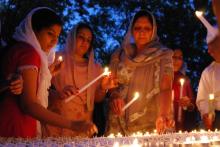
Imagine the terror.
You are in a temple, a safe, sacred place, preparing for a morning service. In the kitchen, you are busy cooking food for lunch, while others read scriptures and recite prayers. Friends begin to gather for the soon-to-start service.
At the front door, you smile at the next man who enters. He does not smile back. Instead, he greets you with hateful stare and bullets from his gun.
Such was the scene Sunday at a Sikh gurudwara in Oak Creek, Wis., just south of Milwaukee, where a gunman, Wade Michael Page, killed six and critically injured three others before being shot down by law enforcement agents.
As Page began his shooting spree, terrified worshippers sought shelter in bathrooms and prayer rooms. Rumors of a hostage situation surfaced, and those trapped inside asked loved ones outside not to text or call their cell phones, for fear that the phone ring might give away their hiding place.
The first police officer to arrive on the scene stopped to tend to a victim outside the gurudwara. He looked up to find the shooter pointing his gun directly at him, and then took several bullets to his upper body. He waved the next set of officers into the temple, encouraging them to help others even as he bled.
That magnanimity is a common theme among the stories of victims and survivors of the Wisconsin shootings. Amidst terror and confusion, Sikhs offered food and water to the growing crowd of police and news reporters outside the gurudwara as part of langar — the Sikh practice of feeding all visitors to the house of worship.
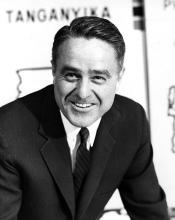
In June my husband, who gets lots of review copies unbidden, asked me if I wanted to read Mark Shriver's memoir about his father, Sargent Shriver, who passed away in 2011 at age 95.
"Since you're a fan of all things Kennedy," he said, "I thought you might want to see it."
I didn't.
True, a high point in my adolescent life was standing in back of St. Matthew's Cathedral one December morning in 1963 waiting for mass to begin when suddenly a very tall, very disheveled, very pregnant Eunice Kennedy Shriver pushed past me, wearing smudged red lipstick and a full-length fur coat. But sons are not necessarily good biographers, and anyway, I had a stack of mysteries awaiting my attention.
But then in July, a Facebook friend pointed me to Reeve Lindbergh's review of A Good Man in the Washington Post, suggesting that this was a book I might want to read. Lindbergh — herself the daughter of two famous parents, Charles and Anne Morrow Lindbergh — called it "a moving and thoughtful book." Maybe I'll read this after all, I said to myself. And then a week or two later, my friend Estelle sent me a copy of the book as an early birthday present, telling me she thought I'd connect with it on many levels.
I must be supposed to read this one, I thought.

The Amish are one of the fastest-growing religious groups in North America, according to a new census by researchers at Ohio State University.
The study, released July 27 at the annual meeting of the Rural Sociological Society, suggests a new community sprouting every three and a half weeks.
Nearly 250,000 Amish live in the U.S. and Canada, and the population is expected to exceed 1 million around 2050.
The growth may not be visible outside Amish country, but the rural settlements definitely see the boom.

Meet the social media “nones.” A new survey finds that Americans, while mostly religious, generally do not use social media to supplement worship and mostly keep their faith private online.
The Public Religion Research Institute survey found about one in 20 Americans followed a religious leader on Twitter or Facebook. A similar number belonged to a religious or spiritual Facebook group.
The results seem to defy the familiar story of prominent religious leaders using social media to build a following – and a brand.
“We were surprised when this turned up really low levels of people engaging religion and faith online,” said PRRI research director Daniel Cox.

I love the Church. I have literally been going to church my whole life — that is, until two months ago.
Then I stopped cold turkey. You can read about it in my post "Walking Away From Church."
Masses of people responded. It astounded me. Most ministers expressed concern saying things like, “My Brother, I am worried that you may be on a dangerous journey,” or, “I fear you may lose your faith.”
Frankly, what I heard them saying was, “Faith is so fragile it needs the Church to enforce it,” which only made me more certain I was making a remarkably healthy spiritual choice.
Former church-going folk frequently told me things like, “There is a large disconnect between the 'Church' of today and the teachings of Jesus,” and “I have found God in a dynamic, deep way and I love God so much more and for real now than when I was unwittingly trying to fit in with my church culture.”
I've been away from church for two months now and I have to say, I am more at peace than I ever have been. My faith is stronger than it ever has been. My family life is healthier than it ever has been. My desire to seek out God and follow the teachings of Jesus is stronger than it ever has been.
I do not want to go back to Church because life outside of Church is better. It just is. There's no dogma complicating the path to God. It is more than refreshing to escape the games church-folk play with the intent of establishing control and “rightness” on their part; it is life-giving to escape it.
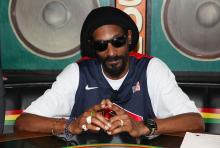
Back in in 1993, Snoop Dogg scored a huge hit with the hip-hop anthem “What’s My Name?” Announcing his conversion to Rastafarianism on Monday, the rapper unveiled a new answer to that lyrical question.
“I want to bury Snoop Dogg and become Snoop Lion,” he said at a press conference.
So, did the onetime gangsta rapper have to drop the "d-o-double-g" when he became a Rasta? Yes, and no, said Ennis Edmonds, a scholar at Kenyon College and an expert on Rastafarianism.
The religious movement doesn’t require converts to change their names. But the faith was born in Jamaica, where calling someone a dog is deeply insulting, Edmonds said.
“Rastas would probably see calling yourself a dog as an indication of lack of self-knowledge,” Edmonds said.

Whether wrestling with one the of non-heterosexual identities or the exigencies of birth control, the hidden costs of pornography, or the viability of chastity, 21st-century Christians have been confronted with unforeseen challenges that have led us to rethink traditional teachings on sexuality.
In many cases, particularly in more progressive expressions of faith, our sexual ethics have adapted and shifted more quickly than our theology (as is often the case). For generations to come, however, a sound theological framework is needed to support a robust Christian sexuality capable of dealing with “the world we find ourselves in.” The hands and feet of our ethical impulses have progressed boldly into unexplored terrain, but unless we discover the body that will provide a balance and stability, such ethical stances will be bound to collapse.
What we need is “a new kind of sexuality,” a response to emerging realities that is both orthodox and open, free and faithful. Such a framework will ultimately be bound to the Great Tradition of the Church while resisting enslavement to interpretations and applications of this Tradition that are now seem incapable of addressing heretofore unexplored questions. It is such “a new kind of sexuality” that I offer here, a starting point as we begin to shape a foundation that will provide the solid ground from which our ethics might find roots. I believe that such a framework will consist of the following five characteristics.
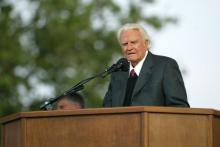
Let me tell you about Billy Graham, just as he is, because based on what I experienced working for the man for six years, two statements issued under his name last week (and one earlier this year) significantly collide with the well-established values of this great humble faith leader.
The first statement I am referring to is the fundraising letter for the Billy Graham Evangelistic Association (BGEA) that quoted Billy's late wife Ruth as saying, "If God doesn't punish America, He'll have to apologize to Sodom and Gomorrah." The letter goes on, in Billy's alleged words, "My heart aches for America and its deceived people."
The second statement is Billy's statement of support for "my good friends [Chick-fil-A founder] Truett Cathy and his son Dan Cathy ... for their strong stand for the Christian faith." The statement actually continues, in Billy's voice, to say, "As the son of a dairy farmer who milked many a cow, I plan to 'Eat Mor Chikin' and show my support by visiting Chick-fil-A next Wednesday." (Update: BGEA issued a revised statement clarifying that Billy now "plans to enjoy his chicken at home.")
The earlier statement was a full-page ad for Amendment One and the North Carolina state constitutional amendment stating the only valid and recognized domestic legal union to be "marriage between one man and one woman." The ad was emblazoned with Mr. Graham's distinguished elderly visage, and appeared in 14 North Carolina newspapers in advance of the May 8 vote that established the amendment as N.C. state law.
At the time of the Amendment One ad, official Billy biographer William Martin told the Associated Press that he believed the words were not those of Billy's son and current BGEA President Franklin Graham: "Franklin has been more outspoken about it, but it sounds as if this is Mr. Graham expressing his own will."
I believe Martin was wrong then, and I'm even more convinced now. Mr. Graham had never made political statements like this in the 62-year history of the ministry, and BGEA's evangelistic crusades have never partnered with corporations like Chick-fil-A, although they easily could have. (Evangelist Luis Palau, a disciple of Billy's, uses corporate sponsors for all of his city-wide events these days.) Now, to have three of these statements come out in the past three months — and a very obvious commercial for a fast-food chain — causes me to wonder if this trickle will turn into a flood, right at the end of Billy's life.
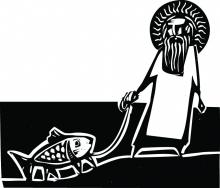
In a recent post here on God's Politics, Derek Flood suggested (as many have lately) that Christian communities need to start taking this whole "faith and science" thing seriously.
I posted some relatively snarky comment on my Facebook page about it (I apologize for the snark) suggesting that the authors of these recent posts about faith and science are ignoring about a century's worth of conversation and theology. Perhaps more.
Let me give you an example of what I mean in Harry Emerson Fosdick.***
As I said just yesterday, Fosdick was famous for lots of things, particularly the sermon "Shall The Fundamentalists Win?" which he preached on May 21, 1922.
It was a call to arms of sorts within the church, encouraging tolerance and a willingness to engage the minds of believers and unbelievers alike in a time of incredible scientific discovery.
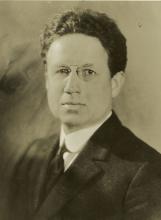
Okay... for all my friends out there. No, history does not repeat itself. Yes, history is a human construct. Now, if you will all just work with me, take a gander at this longish quotation from the Introduction to The Meaning of Prayer (1916) by Harry Emerson Fosdick (pictured here). The introduction was written by John R. Mott. It could have been written last week.
These meditations and studies on prayer are most timely. Never have there been such extensive and such convincing evidences of the poverty and inadequacy of human means and agencies for furthering the welfare of of humanity; never has there been such a widespread sense of the need of superhuman help; never have there been such challenges to Christians to undertake deeds requiring Divine cooperation; never has there been such a manifest desire to discover the secret of the hiding and of the releasing of God's power. Interest in prayer is world-wide. This is shown in the prominence of this subject in addresses and sermons in all lands, as well as by the growing volume of books and pamphlet literature in different languages. The multiplication of Calls to Prayer and of Prayer Circles, and the formation of Prayer Bands and of Leagues of Intercession, constitute similar testimony. Among Christians everywhere, and even among those who would not call themselves believing Christians, there is being manifested an earnest desire to understand what prayer is and to engage more fully in its exercise.
... An alarming weakness among Christians is that we are producing Christian activities faster than we are producing Christian experience and Christian faith; that the discipline of our souls and the deepening of our acquaintance with God are not proving sufficiently thorough to enable us to meet the unprecedented expansion of opportunity and responsibility of our generation. These studies and spiritual exercises in helping men and women to form that most transforming, most energizing, and most highly productive habit — the habit of Christlike prayer — will do much to overcome this danger.

To coincide with the opening of the 2012 London Olympics on Friday, Christianity Today had an insightful profile of Team USA member and former "Lost Boy" — runner Lopez Lomong, who was abducted from his home in Sudan during the 20-year long civil war.
According to the profile:
That story starts in 1991, when Lomong's home village of Kimotong was attacked by rebels in the second Sudanese civil war. "I was 6 years old when I was abducted at church, which met under a tree," Lomong told Christianity Today at his training base in Portland, Oregon. "They ripped my mother's arm from me, throwing me and other boys into a truck; they blindfolded us, then drove us to a prison camp that trained rebel soldiers."
Lomong and a small group of boys managed to escape from the torturous conditions they found themselves in, and found their way to a refugee camp near the Kenyan capital of Nairobi, where Lomong “remained for 10 years.”

“Words! Words! Words!
I’m so sick of words!
I get words all day through, first from him, now from you. Is that all you blighters can do?”
So, Liza Doolittle challenges the hapless Freddy Eynsford-Hill at the height of a dramatic confrontation in My Fair Lady. Freddy has come to her rescue, with his flowery, long-winded protestations of love, but poor Liza is fed up with words:
“Don't talk of stars, burning above. If you're in love, show me. Tell me not dreams, filled with desire. If you're on fire, show me.”
And you know, Eliza has a point. A well-turned phrase won’t keep you warm at night.
It’s ironic that this drama was penned by one of the great wordsmiths of the English language. The play turns on the transformation of a poor Cockney girl into a proper English lady through the manipulation of her ability to master the English language. One argument put forth in the course of achieving this goal is that it doesn’t matter what you say as long as you say it properly. Style can compensate for the absence of substance.
In contrast, I listened this week to a powerful sermon preached by the Rev. Nadia Bolz-Weber to a gathering of some 34,000 Lutheran youth gathered in assembly in New Orleans.

